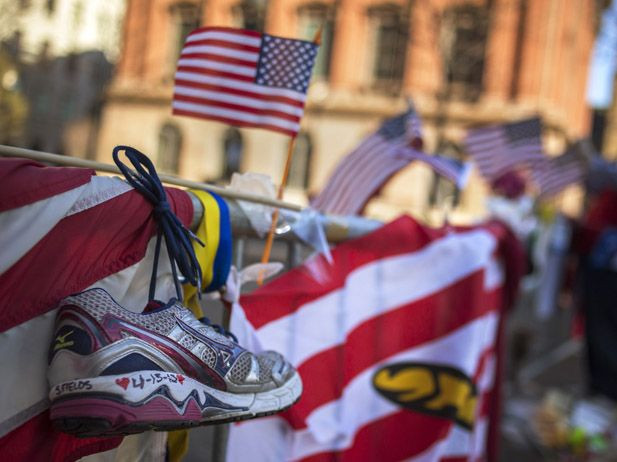Boston Marathon Bombing Coverage Linked To Acute Stress Symptoms; Overexposure To Bomb-Related Media Tied To Mental Health Risks

The emotional damage left in the wake of tragedies like September 11th and the Boston Marathon bombings extends past the people immediately affected by the event. Researchers from the University of California-Irvine have determined in a new study that a certain amount of media exposure tied to April 15, 2013’s attack on the Boston Marathon may have triggered an increase in acute stress-related symptoms.
“There is mounting evidence that live and video images of traumatic events can trigger flashbacks and encourage fear conditioning,” said E. Alison Holman, associate professor of nursing science at UC Irvine, in a press release. “If repeatedly viewing traumatic images reactivates fear or threat responses in the brain and promotes rumination, there could be serious health consequences."
Holman and her colleagues from UC Irvine tracked the behavior of 4,675 adults for two to four weeks following the 2013 Boston Marathon. The research team analyzed behavioral responses to the bombings, direct exposure to the event, indirect exposure via television, social media, print or radio, prior exposure through a similar devastating event and acute stress symptoms, such as disturbing thoughts pertaining to the event, attempts to avoid discussing the event, feeling on the edge or detached from victims, and the event itself.
Individuals who were exposed to over six hours of media coverage related to the Boston Marathon bombing each day were nine times more likely to report high acute stress compared to people who were exposed to around one hour a day. Results of this study clash with the Diagnostic & Statistical Manual of Mental Disorders, which discounts media exposure as a possible trauma-inducing trigger.
"We were very surprised at the degree to which repeated media exposure was so strongly associated with acute stress symptoms," Prof. Holman explained. "We suspect that there's something about repeated exposure to violent images or sounds that keeps traumatic events alive and can prolong the stress response in vulnerable people.
The researchers suggest that the study calls into question the the impact of direct versus indirect exposure to tragic events. Although the majority of acute stress symptoms are felt by people closest to the devastation, lengthy viewing of media exposure following the events can also result in a chronic form of stress.
"In our prior work, we found that early and repeated exposure to violent images from the terrorist attacks of Septempber 11th and the Iraq war may have led to an increase in physical and psychological ailments up to three years [later]," said Roxane Cohen Silver, professor of psychology and social behavior, medicine and public health at UC Irvine, and the study's co-author. "Our new findings contribute to the growing body of research suggesting that there is no psychological benefit to repeated exposure to graphic images of horror."
A similar study conducted at the Weill Cornell Medical College’s Department of Public Health found that over one million former smokers picked the habit back up following the terrorist attacks of September 11, 2001. Based on 1,657,985 responses included in the Behavioral Risk Factor Surveillance System, researchers found that between 950,000 and 1.3 million former smokers started back up after the events on 9/11.
"This study provides the first unbiased estimate of the effect of stress on smoking, and the finding that there was such a big increase in smoking nationwide, seemingly due to one event, is extraordinary, and surprising. It sheds light on a hidden cost of terrorism," said lead researcher Dr. Michael F. Pesko. "There is a consensus in the research community that stress is a very large motivator for individuals to use substances, but this has not really been studied very thoroughly."
Source: Holman EA, Garfin DR, Silver RC. "Media’s role in broadcasting acute stress following the Boston Marathon bombings." Proceedings of the National Academy of Sciences. 2013.
Published by Medicaldaily.com



























